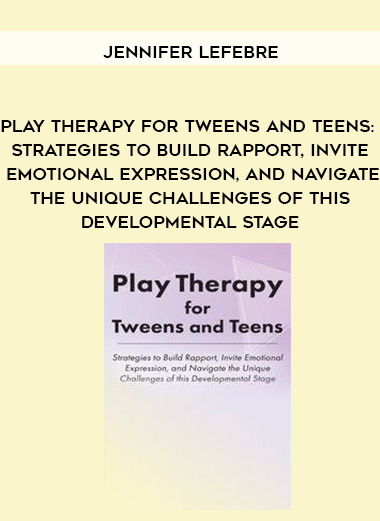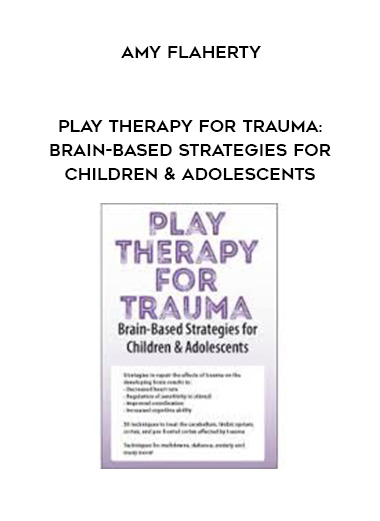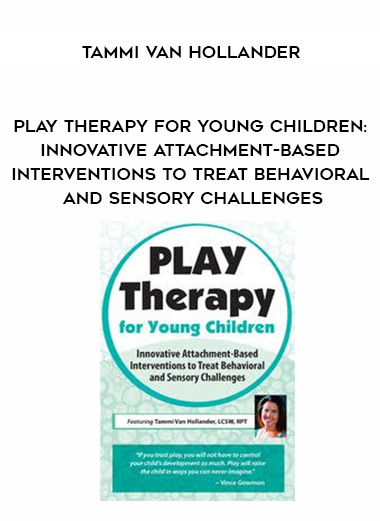PLAY THERAPY FOR TWEENS AND TEENS: STRATEGIES TO BUILD RAPPORT, INVITE EMOTIONAL EXPRESSION, AND NAVIGATE THE UNIQUE CHALLENGES OF THIS DEVELOPMENTAL STAGE – JENNIFER LEFEBRE
Living in a developmental stage that is inherently confusing and chaotic, adolescents are vulnerable, unsure of themselves, and often guarded when it comes to trusting and relating to others. Most teens and tweens are not in therapy by choice, and typically are NOT interested in talking about their feelings or the issues adults have identified as “problems,” especially with a stranger.
As a therapist, this presents a challenge for engaging teens and tweens who are clearly struggling but unwilling or unable to talk about it. At a time when adolescents and preteens need our help in navigating the multiple challenges of family, academic, and social life more than ever, the gap between clinical theory as taught in graduate school and real-life practice continues to widen.
Play therapy offers a unique avenue for expression that honors these clients’ developmental level and gives language to their thoughts and feelings in a non-threatening manner. Through the power of play, you can help teens and tweens process their emotions, build self-regulation skills, improve distress tolerance, and discover themselves in a non-directive safe way.
Watch trauma expert and Registered Play Therapist Supervisor (RPT-S), Dr. Jennifer Lefebre, in this recording full of creative, effective play-based interventions that can easily be integrated into the work you are already doing.
Using music, metaphors, art, movement, sandtrays and more, you can effectively treat many of the clinical issues these kids are facing, including:
- Depression and mood disorders, anxiety, trauma, OCD
- Low self-worth, identity development, self-injury, difficulty relating to others
- Impulsivity and poor judgment, difficulty accepting responsibility
- Pressure related to social media, sexual activity, drug and alcohol use
- And More
Discover how play therapy will inspire and transform your work with tweens and teens!
- Facilitate verbal and nonverbal expressions of thoughts, feelings, and behaviors in teens and tweens through the use of four or more play therapy interventions.
- Transform your work and enhance the capacity for healing and creativity among tweens and teens through play therapy strategies to build resilience and self-esteem.
- Discover how play therapy can increase engagement and build therapeutic rapport within this dynamic developmental stage via play-based assessments and icebreakers.
- Evaluate the balance between both structure & freedom and independence & dependence, and learn at least four play therapy strategies to maintain this flow.
- Build confidence in teaching caregivers how to play with their adolescents, and how to make these experiences part of their daily routines.
- Learn how to combine play therapy and traditional therapies to support the constant shifts in this developmental stage.
ADVANCING ADOLESCENT TREATMENT WITH PLAY THERAPY
Why Play Therapy? What is It, and How is It Different with Teens and Tweens?
- Evidence supporting the benefits of play and creativity with this population
- Therapeutic powers of play
- Neurobiology of play & impact on trauma and attachment
- Avoid pitfalls when working with teens and tweens
- The frustration factor ~ use of cognitive skills and language
- Understand the difference between resistance, opposition and shut-down
- Play-based assessments and icebreakers to increase engagement
- Limitations & potential risks
From Client-Centered to CBT, a Myriad of Play Therapy Approaches as Applied to Adolescents
- Developmental Play Therapy
- Cognitive Behavioral Play Therapy
- Adlerian Play Therapy
- Client-centered Play Therapy
- Theraplay®
- Play therapy with families and groups
ADOLESCENT DEVELOPMENT ~ TASKS, THEORIES & CHALLENGES
Physical, Cognitive, Moral, and Psychosocial Development Changes and Milestones of Tweens and Teens
- Autonomy from parents & family
- Relationships, friendships & intimacy
- Identity development
- Moral reasoning & physical and intellectual growth
Influences of Culture, Heredity, Environment and Social Setting on Adolescents
- Social media, television and movies, music, electronics…oh my!
- This is the world we live in…how it effects treatment and growth
Striking a Balance
- Structure & freedom and independence & connection
- Verbal intellect & playfulness and creativity
- Strategies to teach caregivers how to play with their adolescents, and how to make these experiences part of their daily routines
PROVEN PLAY THERAPY TECHNIQUES
Enjoy the Silence ~ How to Use Silence to Increase Engagement and Therapeutic Rapport
- Try not to laugh
- Hide & seek & peek-a-boo
- What might this be? What can this do??
Walk this Way ~ Embodied Play Therapy and Movement Techniques to Increase Emotional and Behavioral Regulation
- The floor is lava…The floor is quick sand
- Mirror, mirror
- Trauma-informed yoga
What’s on Your Play List? ~ How to Use Music to Facilitate Therapeutic Discussion
- Trashballs
- Catch the beat
- What are you listening to?
Enter Sandman ~ The Use of Sandtrays to Facilitate Verbal and Nonverbal Expressions of Thoughts, Feelings and Behaviors
- Safe Place
- Futurerama
- Half & half
How to Use Drawing, Paint, Clay, Masks, and More!
Tag: Play Therapy for Tweens and Teens: Strategies to Build Rapport, Invite Emotional Expression, and Navigate the Unique Challenges of this Developmental Stage – Jennifer Lefebre Review. Play Therapy for Tweens and Teens: Strategies to Build Rapport, Invite Emotional Expression, and Navigate the Unique Challenges of this Developmental Stage – Jennifer Lefebre download. Play Therapy for Tweens and Teens: Strategies to Build Rapport, Invite Emotional Expression, and Navigate the Unique Challenges of this Developmental Stage – Jennifer Lefebre discount.




